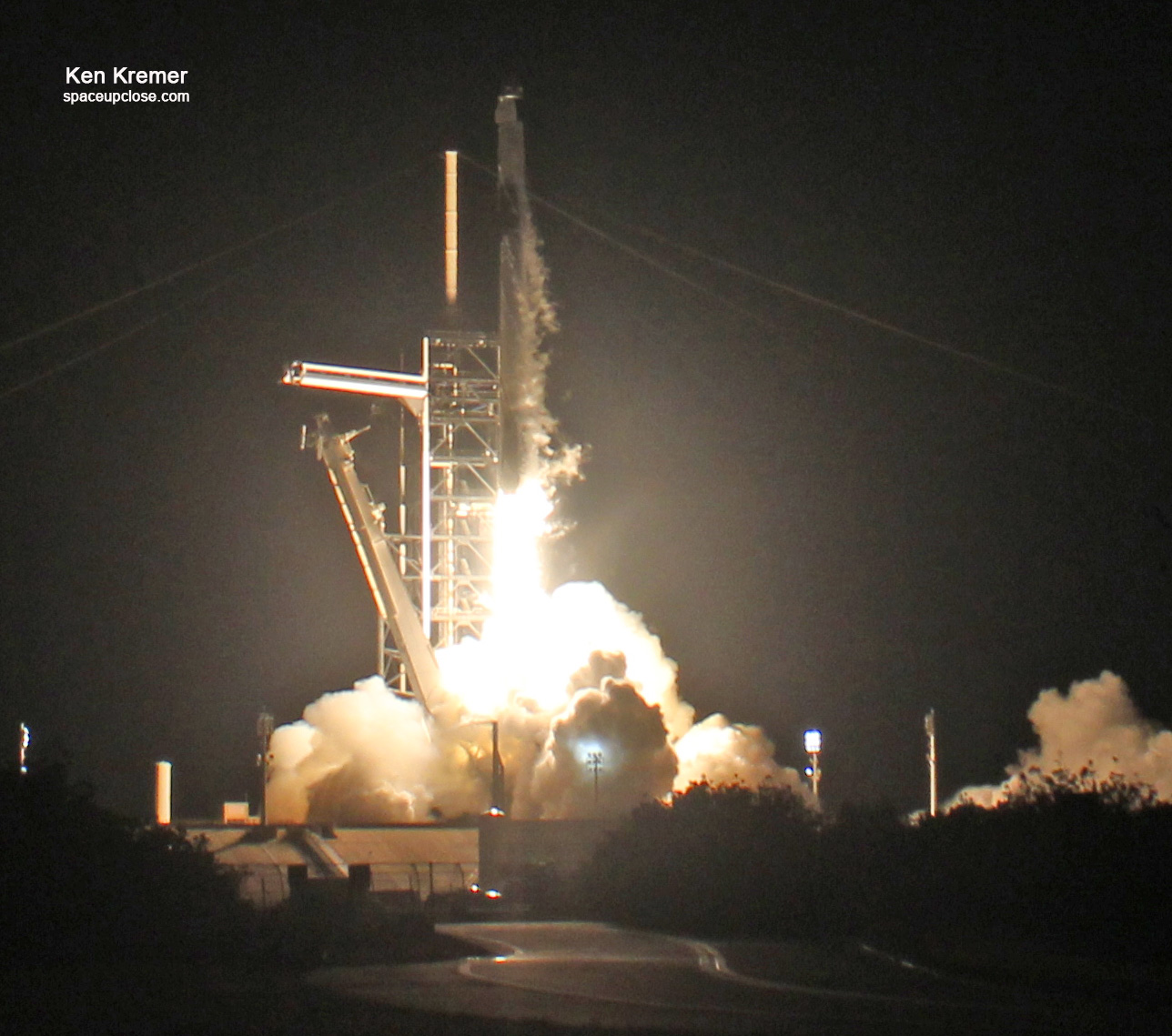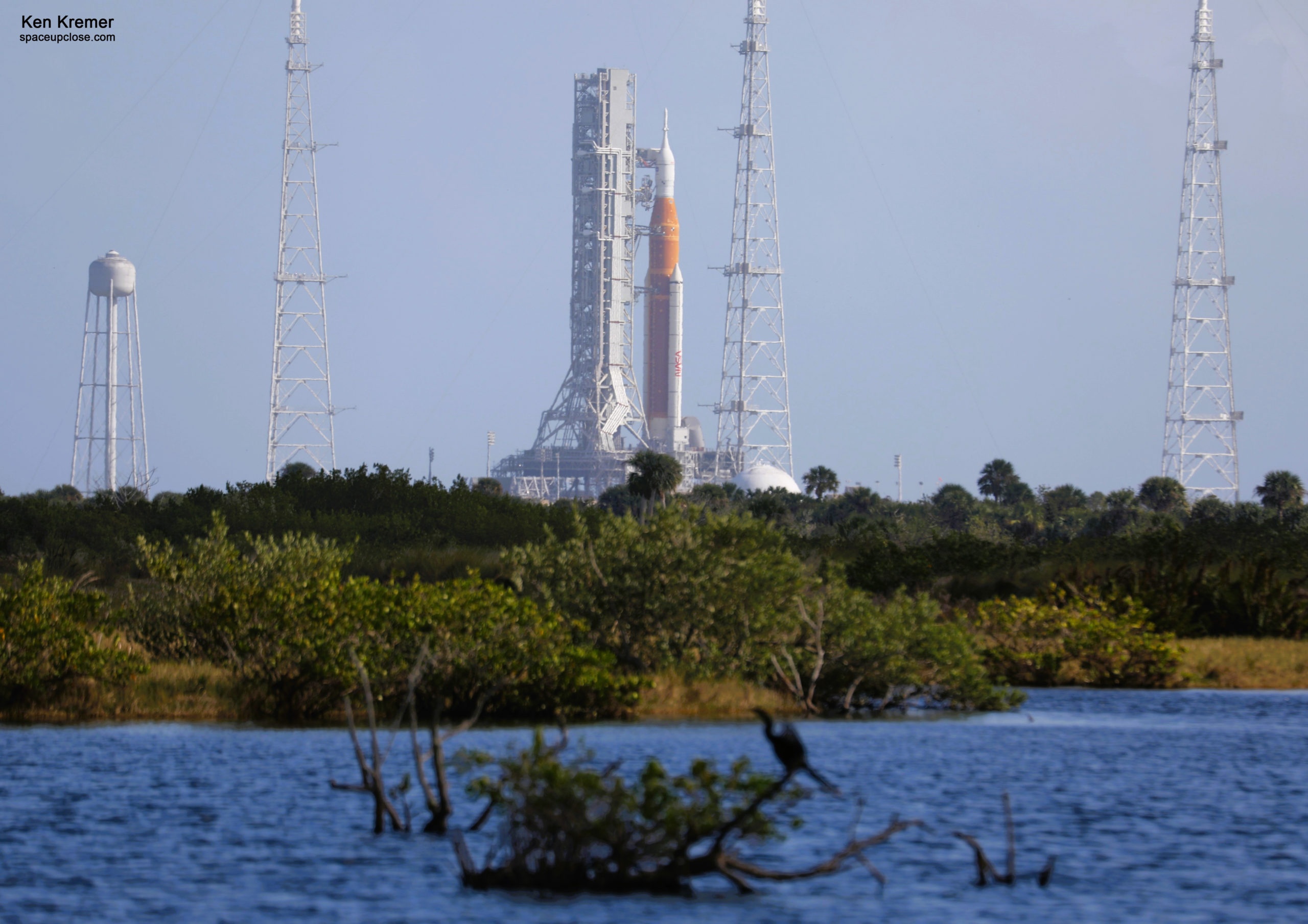
For SpaceUpClose.com & RocketSTEM
PLAYALINDA BEACH/KENNEDY SPACE CENTER, FL – Here’s a last look at NASA’s Artemis 1 Moon rocket standing vertical at launch pad 39B at NASA’s Kennedy Space Center in Florida on Monday, Nov. 7, just prior to the impending landfall of Hurricane Nicole on Florida’s East Coast tracking for overnight Thursday, Nov. 10 and consequently face hurricane force winds.
The approaching tropical storm turned Category 1 hurricane caused NASA managers to delay the nighttime liftoff to no earlier than (NET) just after midnight Wednesday, Nov. 16.
That amounts to two day delay from the prior target of just past midnight Nov. 14.
NASA decided to leave the moon rocket exposed at pad 39B to the hurricane force winds since there was not enough time to roll it back to the Vehicle Assembly Building (VAB) shelter hangar at NASA’s Kennedy Space Center for protection from the approaching storm.
Enjoy my photos of Artemis 1 taken from Playalinda Beach and Canaveral National Seashore on Nov. 7.
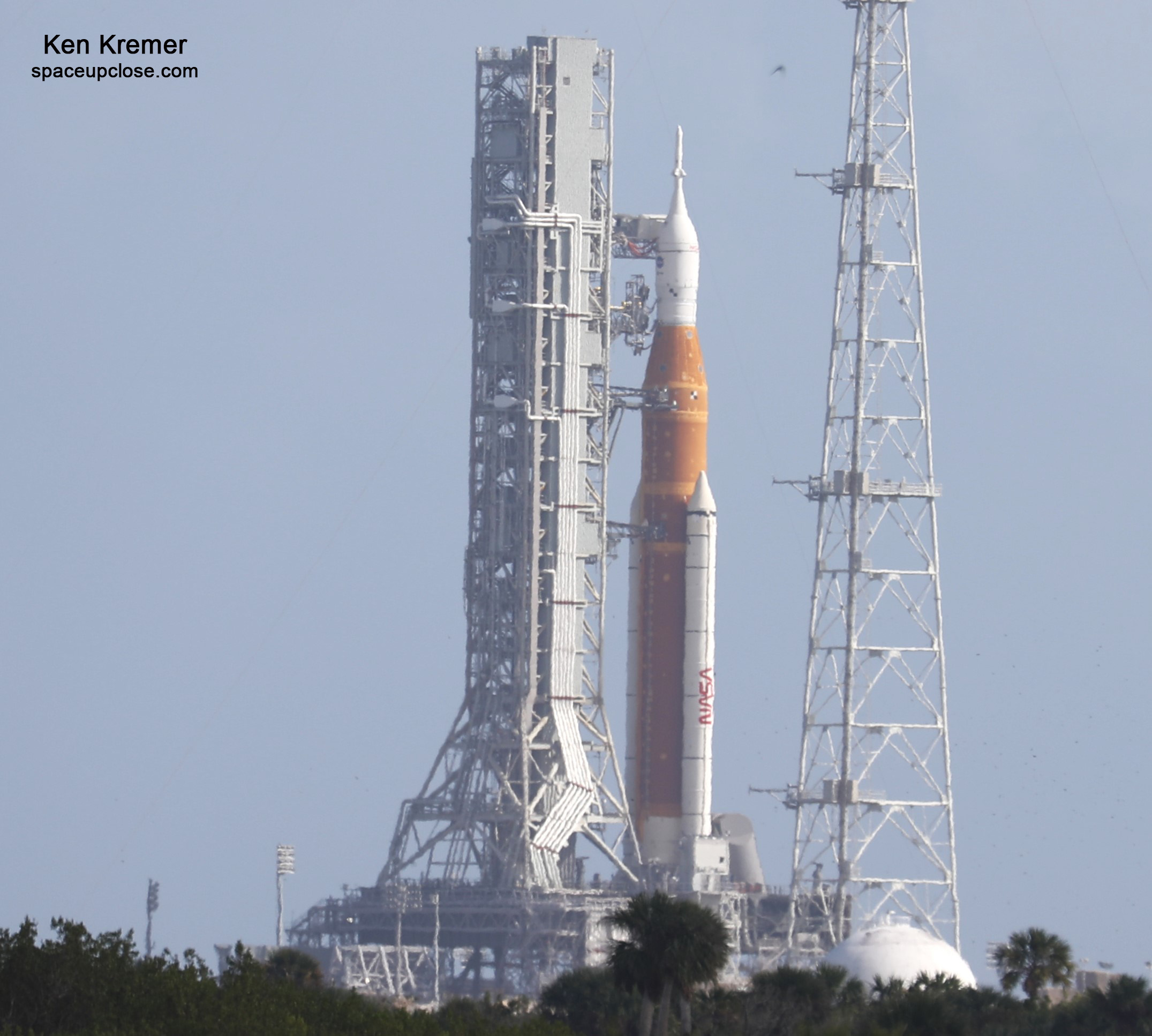
This first ever try at a nighttime launch attempt for Artemis 1 is now rescheduled for Nov. 16 at 1:04 a.m. EST with a launch window that extends for two hours until 3:04 a.m. EST.
A Nov. 16 launch would result in a splashdown on Sunday, Dec. 11.
If needed, NASA has a back-up launch opportunity on Saturday, Nov. 19, and will coordinate with the U.S. Space Force for additional launch opportunities.
The looming Nicole forced NASA to again halt pad operations and postpone liftoff of NASA’s Space Launch System (SLS) rocket integrated with the Orion crew spacecraft for the Artemis I mission because of extreme wind and rain threats approaching Florida just days after it rolled back out to the pad.
“NASA is continuing to monitor Tropical Storm Nicole and has decided to re-target a launch for the Artemis I mission for Wednesday, Nov. 16, pending safe conditions for employees to return to work, as well as inspections after the storm has passed,” said NASA.
“Adjusting the target launch date will allow the workforce to tend to the needs of their families and homes, and provide sufficient logistical time to get back into launch status following the storm.”
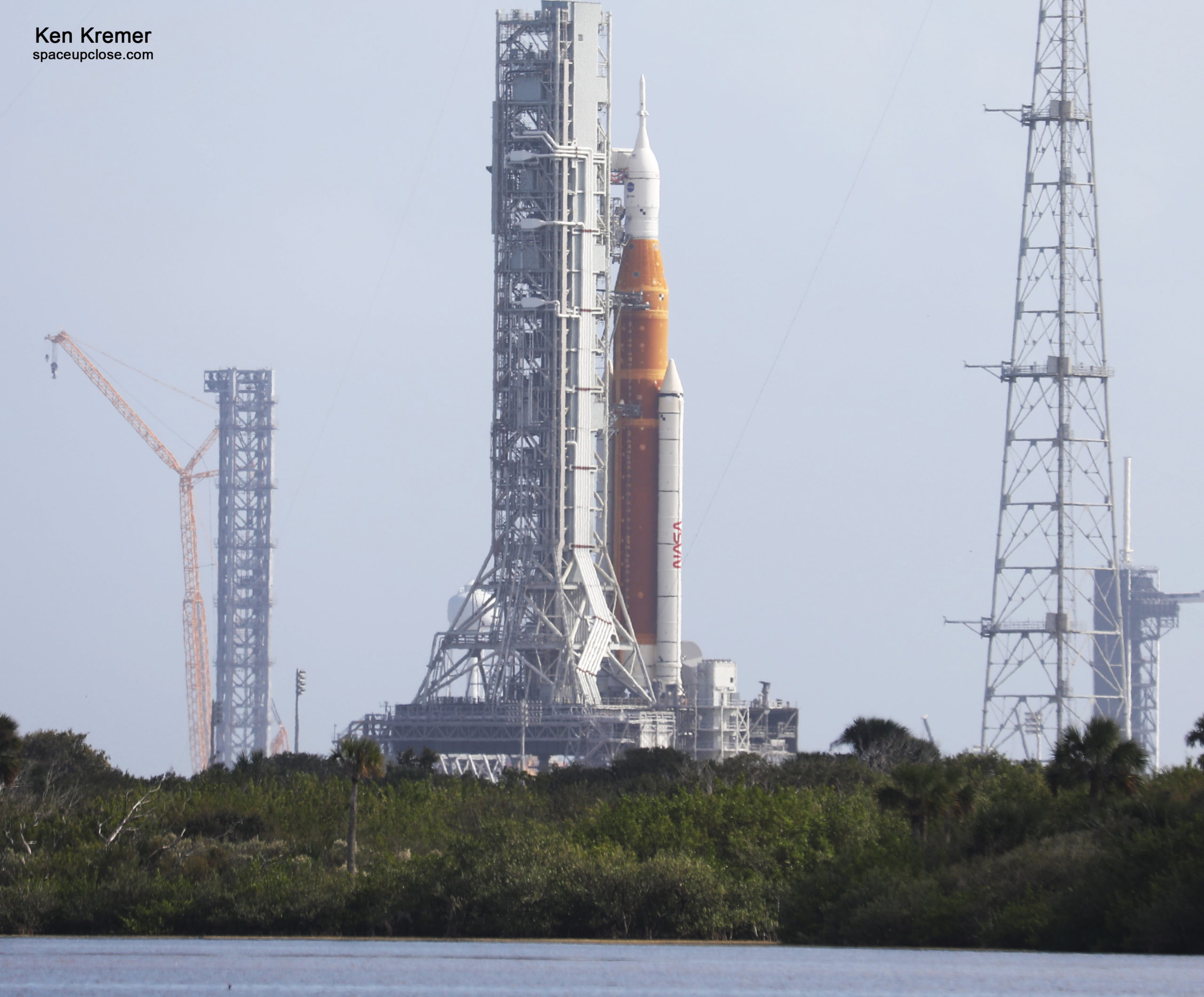
SLS can withstand wind gusts up to 85 MPH at the 60 foot level.
NASA managers said it was safer to keep Artemis 1 out at pad 39B rather than move it back to the VAB during high winds and rain – that were deemed a greater threat to the rocket structural integrity while in motion.
They made the decision to keep Artemis 1 at the pad after extensive discussions concluding Sunday evening, Nov. 6.
“Based on expected weather conditions and options to roll back ahead of the storm, the agency determined Sunday evening the safest option for the launch hardware was to keep the Space Launch System (SLS) rocket and Orion spacecraft secured at the pad,” .
“The SLS rocket is designed to withstand 85 mph (74.4 knot) winds at the 60-foot level with structural margin. Current forecasts predict the greatest risks at the pad are high winds that are not expected to exceed the SLS design. The rocket is designed to withstand heavy rains at the launch pad and the spacecraft hatches have been secured to prevent water intrusion.”
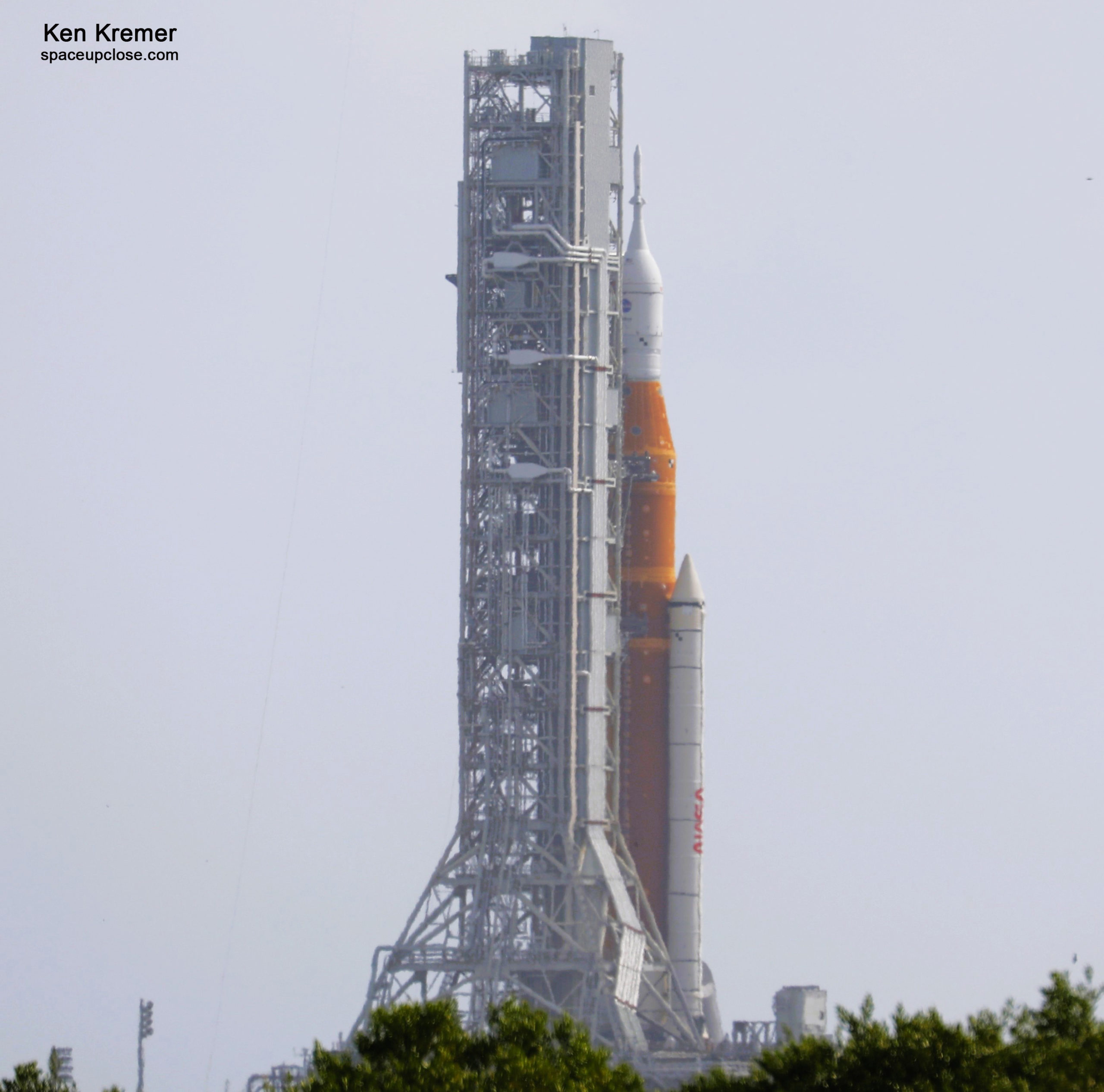
There is virtually no protection for Artemis 1 out at the pad where it remained during the storm.
“In preparation for the storm, teams have powered down the Orion spacecraft, SLS core stage, interim cryogenic propulsion stage, and boosters. Engineers have also installed a hard cover over the launch abort system window, retracted and secured the crew access arm on the mobile launcher and configured the settings for the environmental control system on the spacecraft and rocket elements. Teams also are securing nearby hardware and performing walkdowns for potential debris in the area.”
“Teams are poised to resume work as soon as weather and Kennedy center status allows. Once back on-site, technicians will perform walkdowns and inspections at the pad to assess the status of the rocket and spacecraft as soon as practicable.”
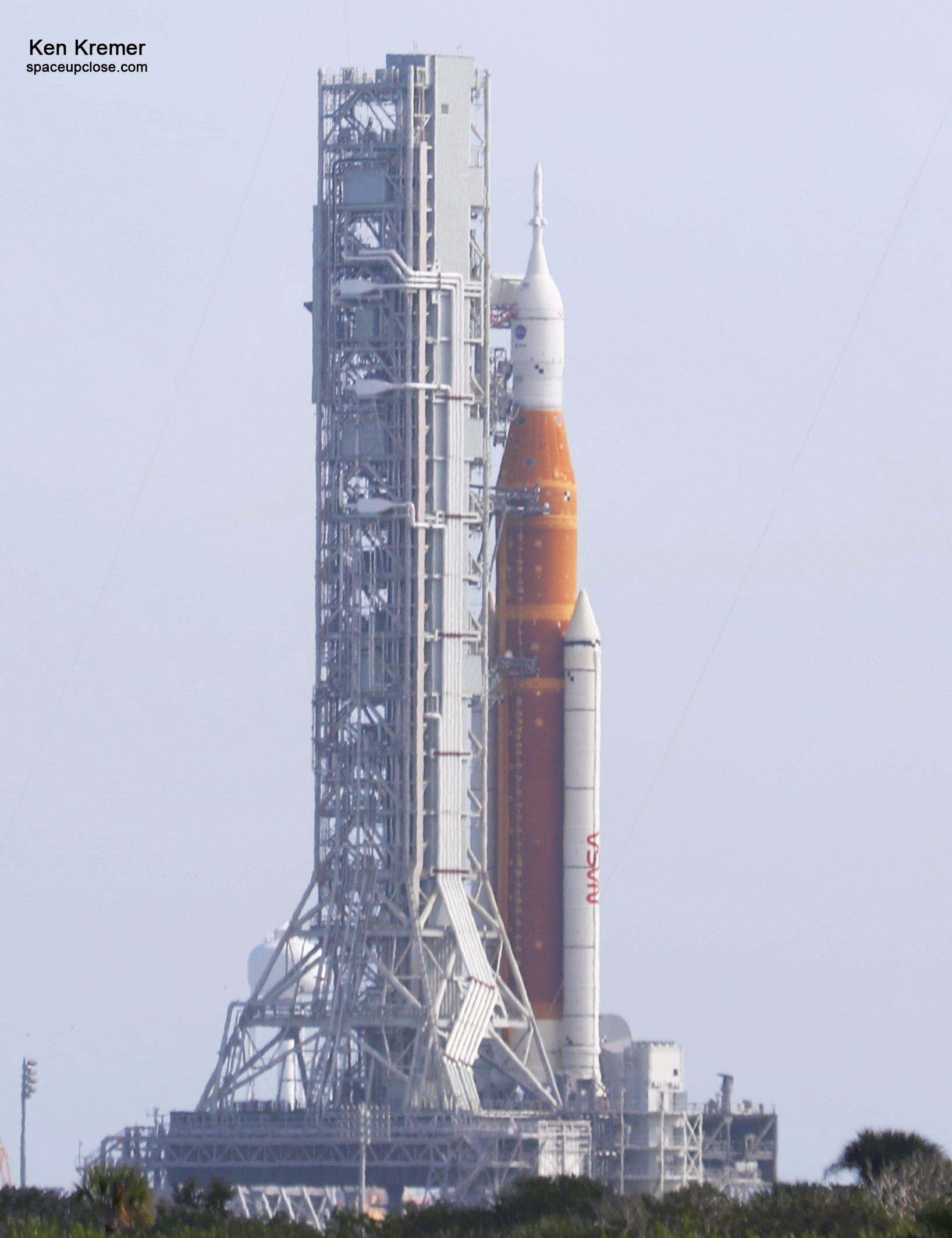
For the fourth and hopefully final time NASA’s Space Launch System (SLS) rocket integrated with the Orion crew spacecraft for the Artemis I mission rolled out to launch pad 39B from the iconic Vehicle Assembly Building (VAB) at NASA’s Kennedy Space Center in Florida starting just before midnight Friday, Nov. 4, ahead of the next launch attempt new rescheduled for just past midnight, Monday, Nov. 14, on a test flight around the Moon and back.
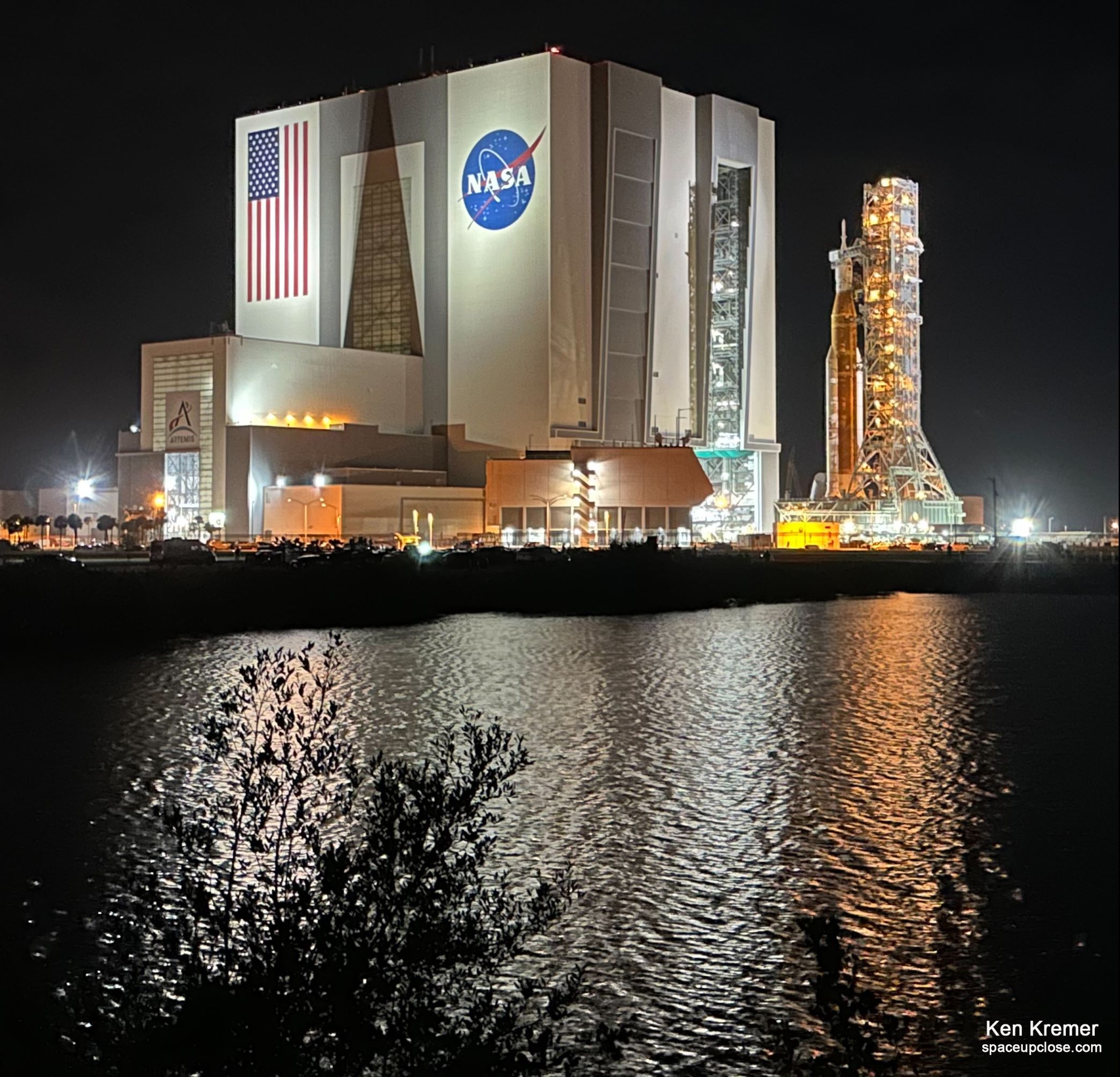
The crawler-transporter hoisted the 322-foot-tall integrated Space Launch System (SLS) rocket and Orion spacecraft stack standing atop the mobile launcher inside the VAB and began the approximately 4.2-mile (6.8 km) nighttime journey from the VAB to the launch pad at about 11:17 p.m. EDT. Thursday Nov. 3, under excellent weather conditions.
At that time Nicole was not a named storm and not felt to be a significant threat to the rocket or launch timing.
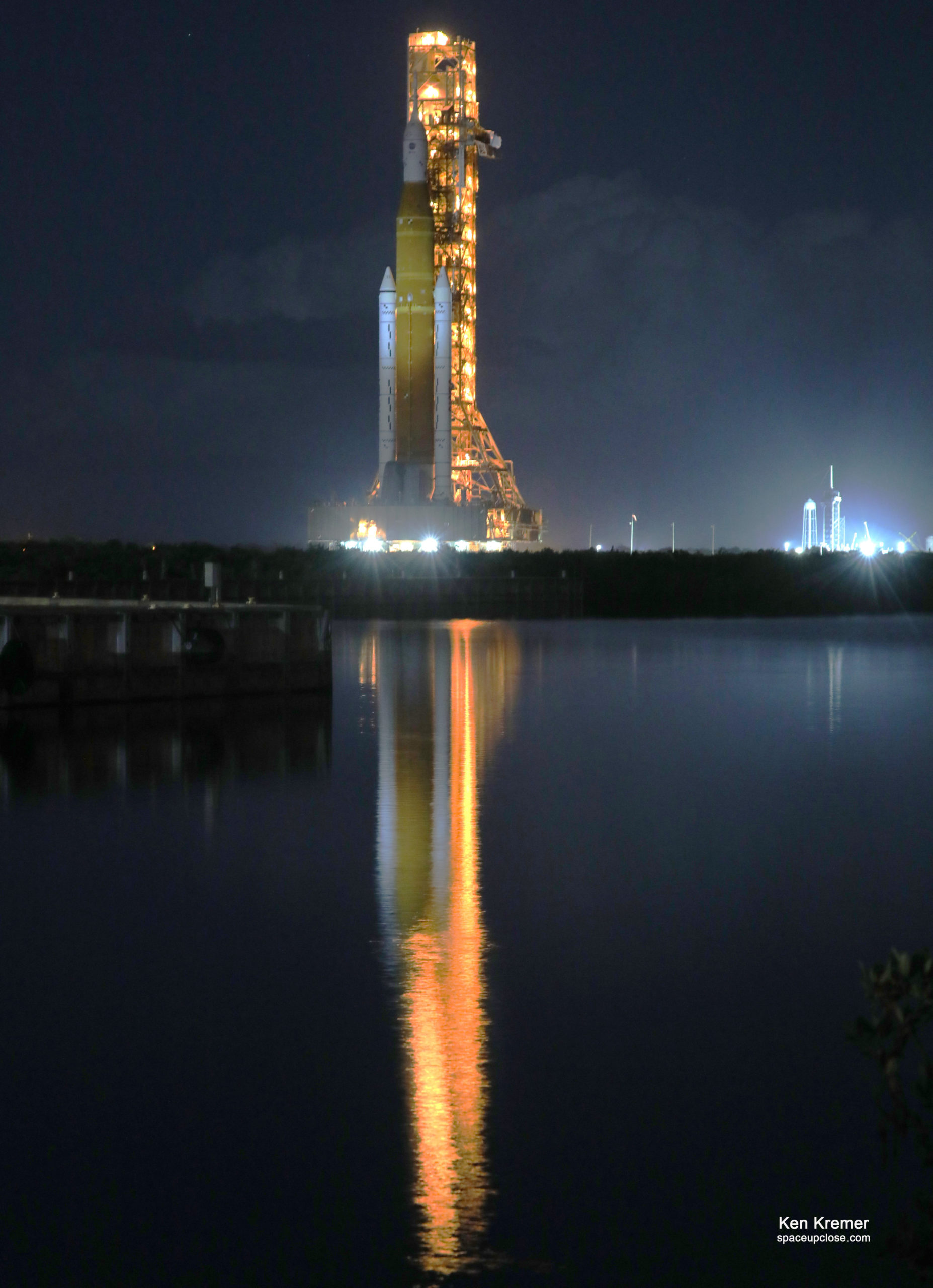
The rollout took place after NASA managers determined it was safe to do so despite the formation of a tropical wave in the Atlantic with the at that time unknown but estimated to lower risk potential to grow in strength and impact KSC
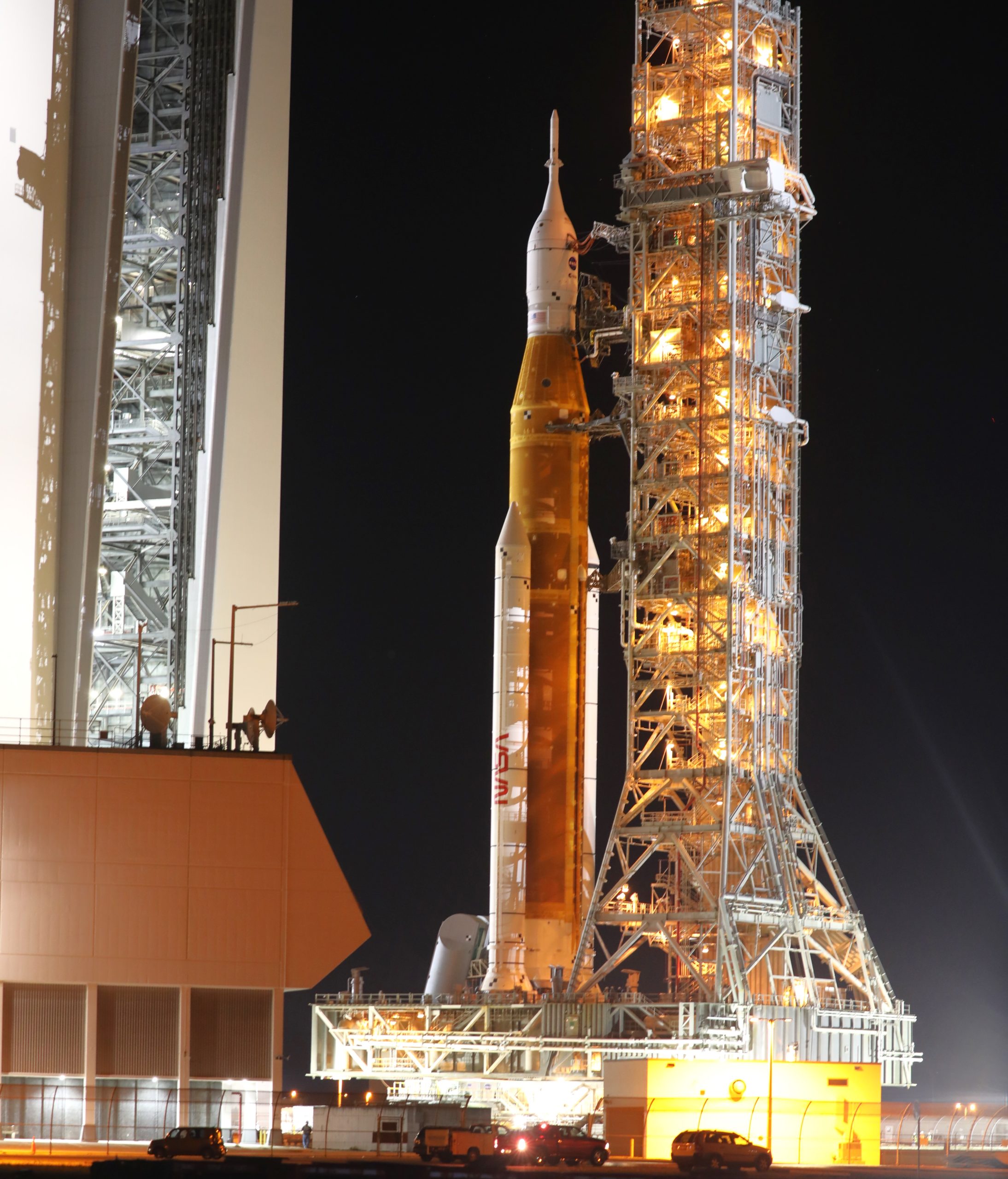
The 32 story tall stack soon emerged from the opened doors of the VAB High Bay 3 where the Artemis 1 mega moon rocket initially underwent assembly and then repairs and refurbishments for the earlier pair of launch attempts and wet dress rehearsal propellant loading and countdown tests.
Artemis 1 arrived at pad 39B after a nearly nine-hour journey from the VAB at around 8:30 a.m. EDT (1230 GMT).
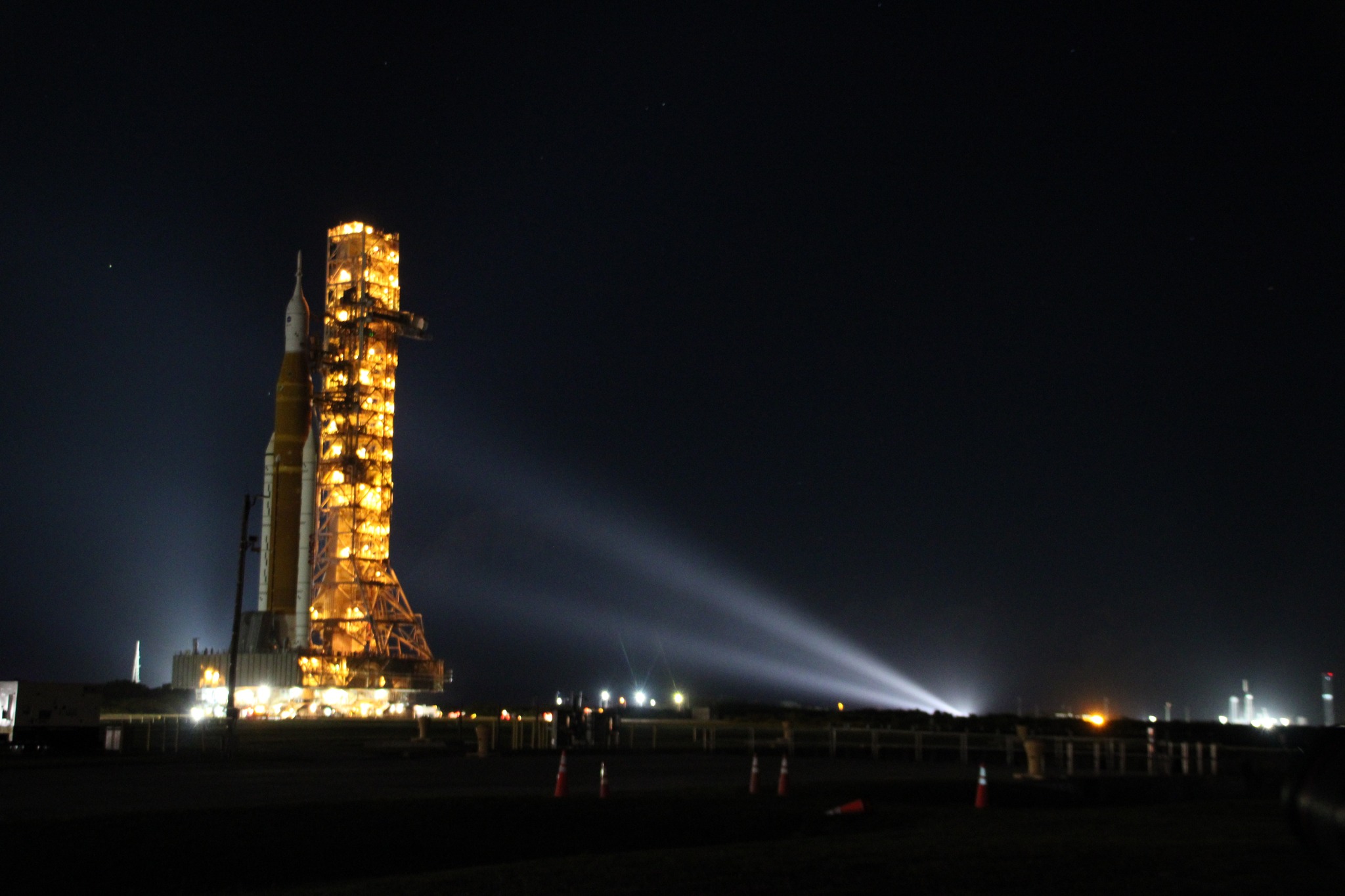
It then moved up the ramp and NASA declared the SLS and mobile launch platform “hard down” on the launch pad at 10:07 a.m. EDT (1407 GMT) Friday, Nov. 4 after about a 10 hour trek.
The crawler-transporter moves at a maximum speed of about 0.8 MPH
The Artemis 1 stack has a mass of 21.4 million pounds and is comprised of the 32 story tall SLS/Orion rocket, its mobile launch platform, and the crawler-transporter
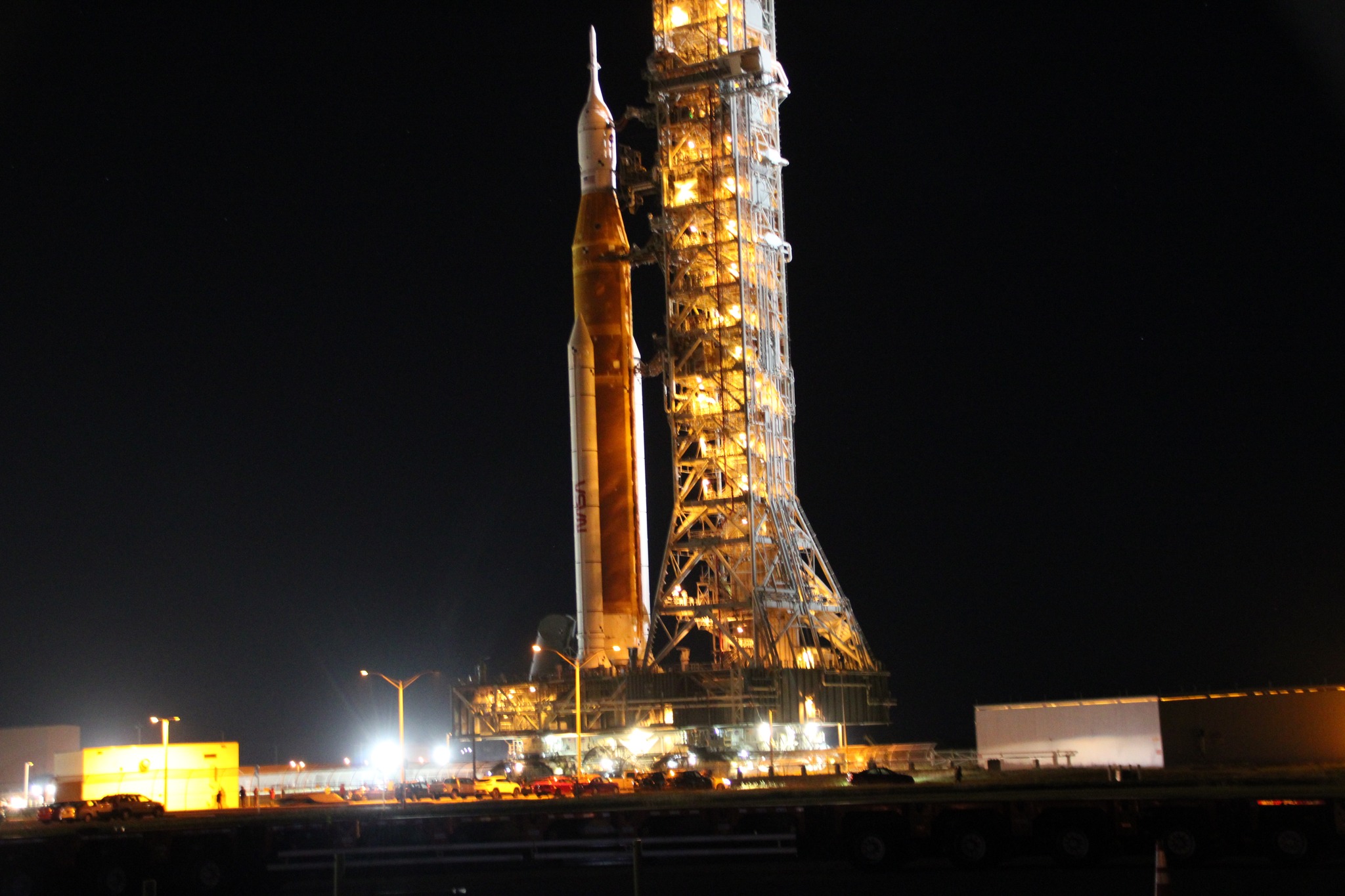
Enjoy our photos showing Artemis 1 emerging from the VAB and the overnight trek towards launch complex 39B taken by Ken Kremer and Jean Wright for Space UpClose.
NASA’s Artemis I flight test is the first integrated test of the agency’s deep space exploration systems: the Orion spacecraft, SLS rocket, and supporting ground systems.
Watch Ken’s commentary about Project Artemis, SpaceX Falcon Heavy, Crew-5, NASA SLS cryo and WDR tests, NASA SpaceX Crew & Cargo Dragons and more
Nov 7/8: Fox 35 Orlando – As subtropical storm Nicole approaches KSC and Florida watch my comments about NASA deciding for the moment to keep Artemis 1 moon rocket at pad 39b and not roll back to VAB
https://www.fox35orlando.com/news/nasa-says-its-keeping-artemis-outside-during-major-storm
NASA says it's keeping Artemis on the launch pad. The rocket can withstand winds up to 85 miles an hour. The @NWSMelbourne is predicting windspeeds could very well hit that point in Brevard County – in fact, a Tuesday morning update says windspeeds could be in the 74-110mph range pic.twitter.com/i569eAmi9p
— Marie Edinger FOX 35 (@MarieEdinger) November 8, 2022
Nov 4/5: WFTV ABC News Orlando featured my commentary about Artemis 1 rollout overnight and goals of NASA lunar test flight mission launching Nov 14 at 1207 AM
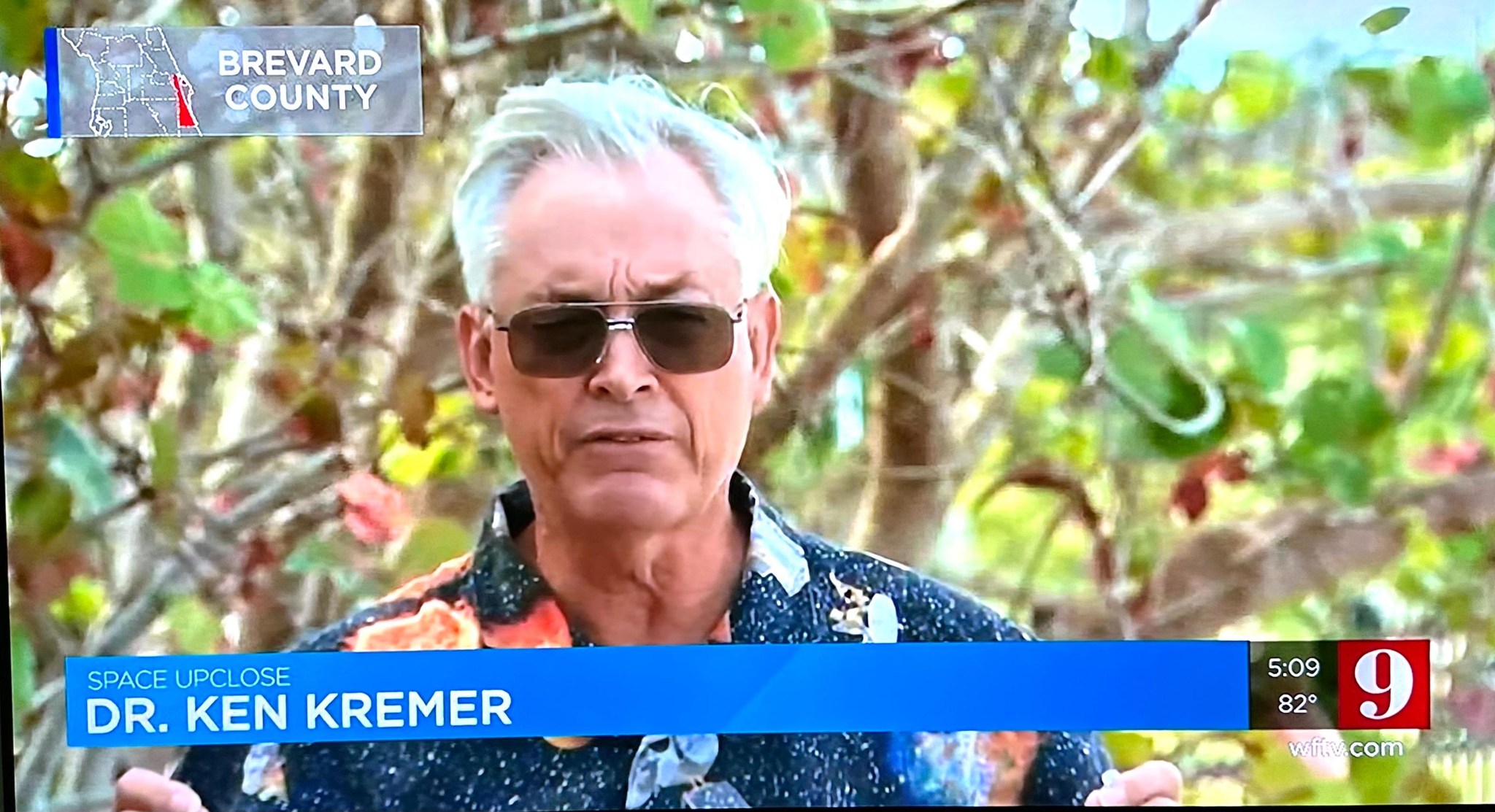
Nov 4: Fox 35 Orlando featured my commentary about Artemis 1 rollout overnight and goals of NASA lunar test flight mission launching Nov 14
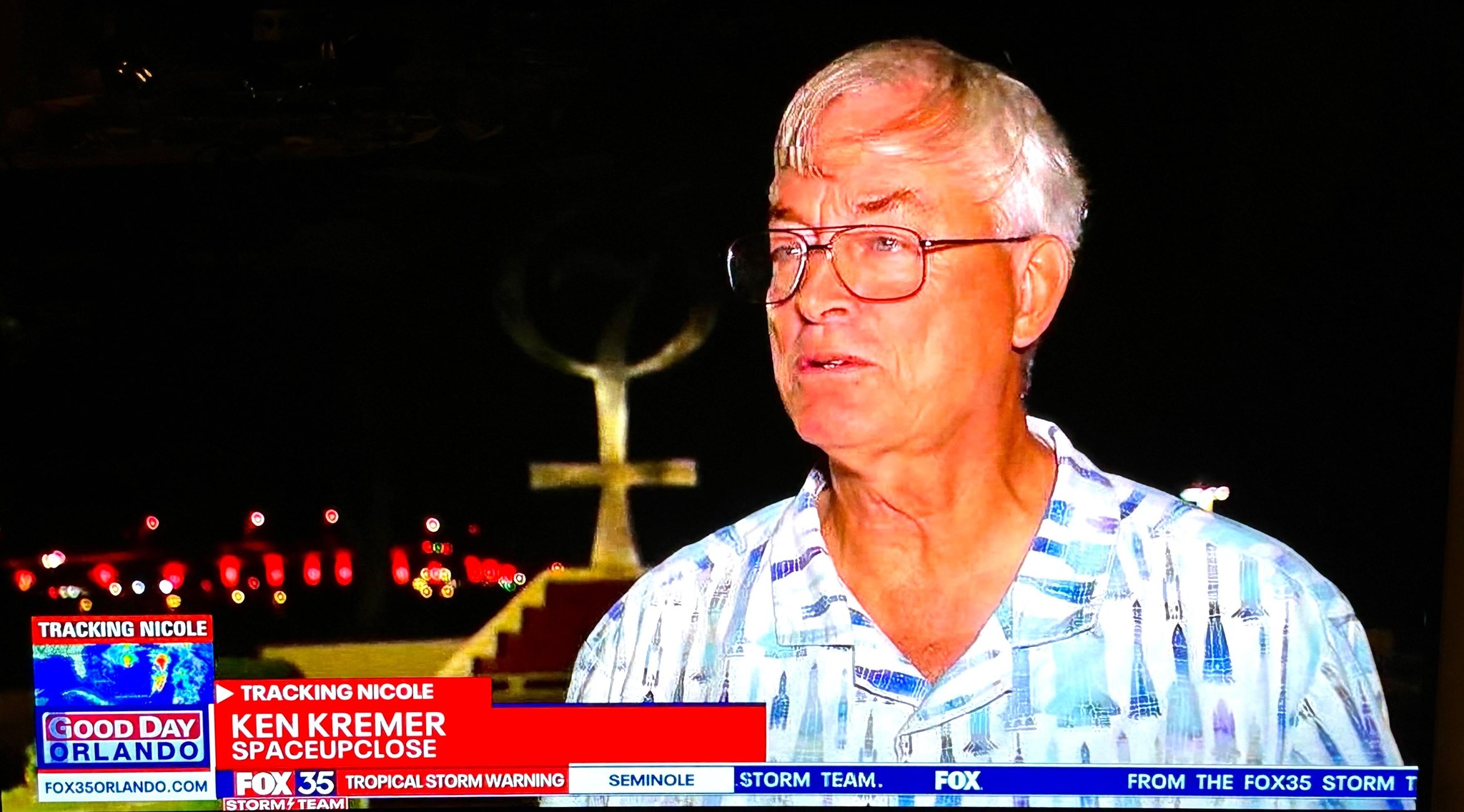
Nov 1: Fox 35 Good Day Orlando morning show featured my live and taped prelaunch interview commentary about SpaceX Falcon Heavy launch with Space Force national security payloads
Nov 1: WFTV ABC News featured my commentary about SpaceX Falcon Heavy launch with Space Force national security payloads
https://news.yahoo.com/watch-lve-spacex-launches-falcon-100341265.html
Oct 31: WFTV ABC News featured my commentary about SpaceX Falcon Heavy launch with Space Force national security payloads
Oct 27: WFTV ABC News and Fox 35 Orlando featured my commentary about Falcon Heavy and the Space Force national security payloads
https://www.fox35orlando.com/video/1137117
Watch Ken’s continuing reports about Artemis, SpaceX missions, SLS, Orion and NASA missions, SpaceX Crew and Cargo Dragons, SpaceX Axiom, JWST, DART, Lucy Asteroid mission, GOES, SpaceX Starlink, Commercial Crew and Starliner and Crew Dragon, Blue Origin and Space Tourism, and onsite for live reporting of upcoming and recent SpaceX and ULA launches including Crew 1 & 2 & 3 & 4 & 5, ISS, Solar Orbiter, Mars 2020 Perseverance and Curiosity rovers, NRO spysats and national security missions and more at the Kennedy Space Center and Cape Canaveral Space Force Station.
Stay tuned here for Ken’s continuing Earth and Planetary science and human spaceflight news: www.kenkremer.com –www.spaceupclose.com – twitter @ken_kremer – email: ken at kenkremer.com
Dr. Kremer is a research scientist and journalist based in the KSC area, active in outreach and interviewed regularly on TV and radio about space topics.
………….
Ken’s photos are for sale and he is available for lectures and outreach events
Please consider supporting Ken’s work by purchasing his photos and/or donating at Patreon
https://www.patreon.com/kenkremer
Upcoming and recent space events and talks by Ken Kremer & Jean Wright
Nov 14/15 from 7 to 9 PM Quality Inn, Titusville, FL: Join Ken and Jean for Artemis 1, Falcon Heavy and space mission and rocket launch outreach. Ask us anything. plus display our photos and space apparel items for sale
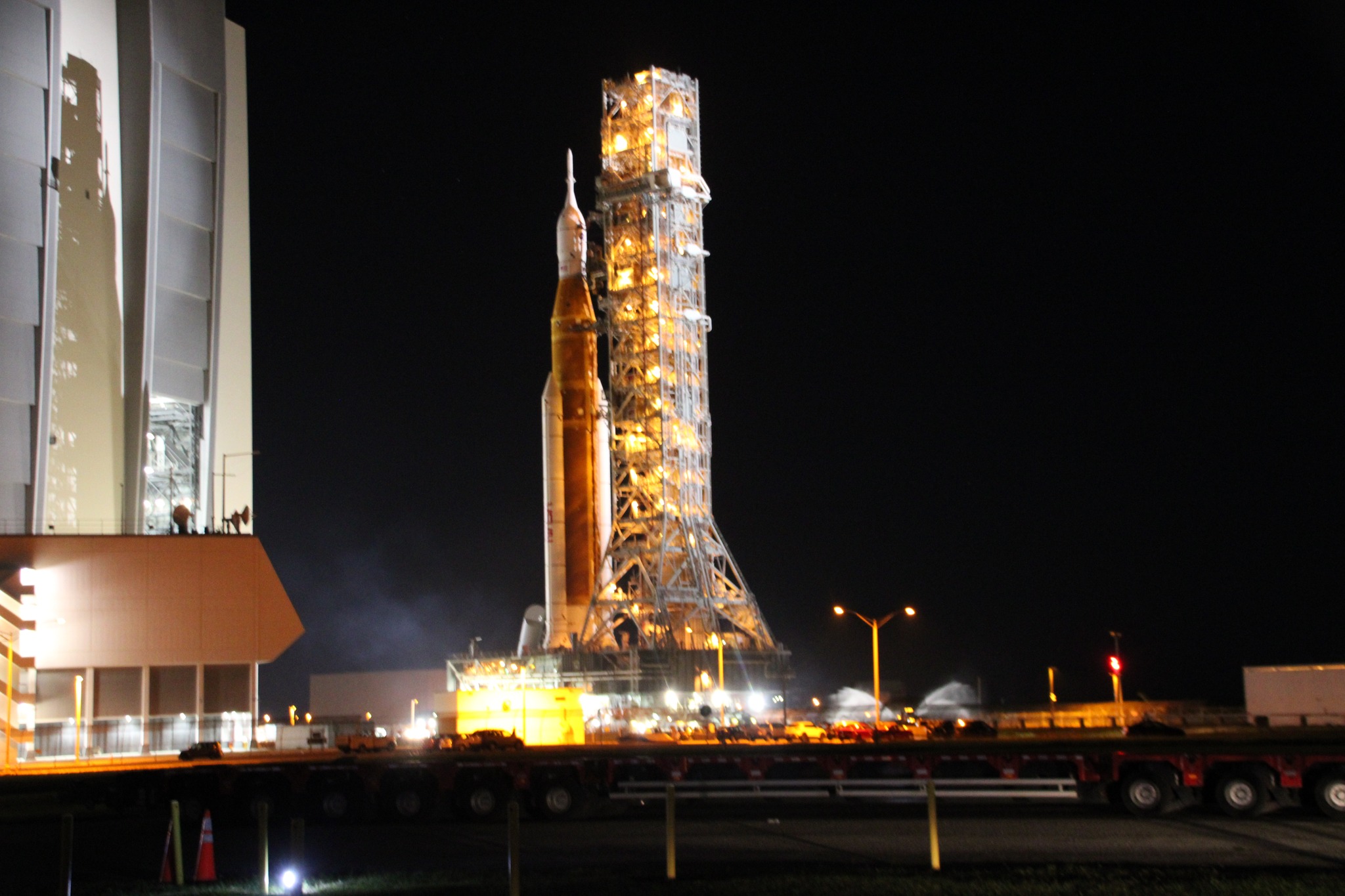
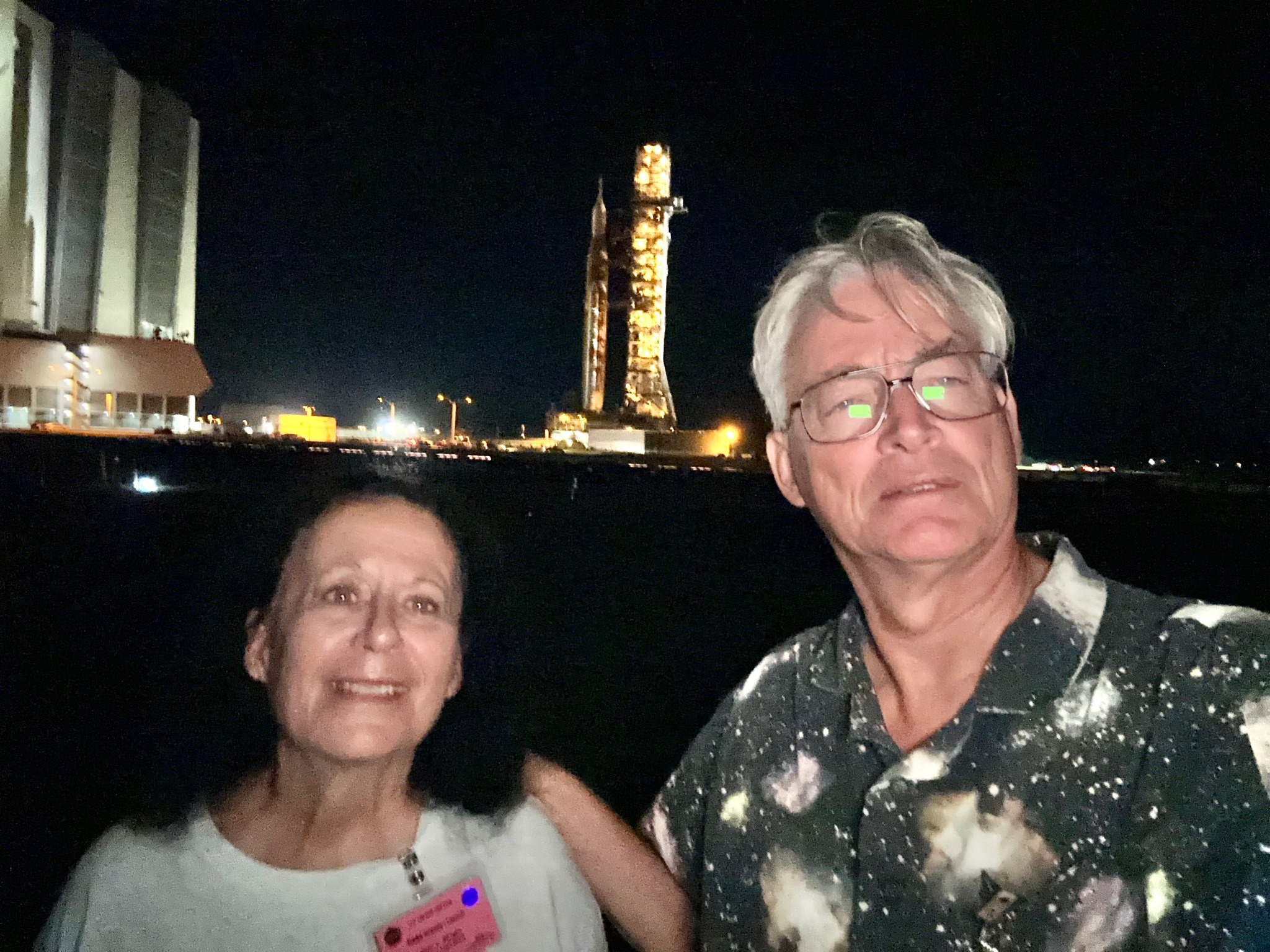
x


